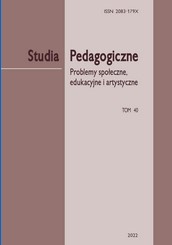Wolontariat koleżeński jako forma wsparcia psychospołecznego osób w spektrum autyzmu – przykład programu wolontariat koleżeński „Mary i Max”
Befriending as a way of psychosocial support of autistic persons – the case of Peer Volunteers ‘Mary and Max’
Author(s): Bożena ChrostowskaSubject(s): Social differentiation, Health and medicine and law
Published by: Wydawnictwo Uniwersytetu Jana Kochanowskiego
Keywords: Volunteering; mentoring; befriending; psychosocial support of autistic people; social support system;
Summary/Abstract: The growing number of people diagnosed with the autism spectrum disorder in Poland and the problems they experience in everyday life and/or in the access to the support systems make it important to consider looking for additional solutions in order to help them. A noteworthy solution, successfully implemented in Great Britain, are the befriending, mentoring volunteering programs that function there as a standard of help to autistic people. In Poland, those forms of volunteering are still unpopular and such volunteering is rarely used. There are also few studies on this subject. The aim of the article is therefore to fill the gap in that matter. It will discuss the assumptions, the methods of organization and forms of this type of support based on the example of the “Mary and Max” Peer Volunteering Program, which has been implemented in Poland for several years by the Association of Social Innovations “Mary and Max”. The article will also analyse the potential, limitations and effectiveness of befriending as a form of support for people with autism spectrum.
Journal: Studia Pedagogiczne. Problemy Społeczne, Edukacyjne i Artystyczne
- Issue Year: 40/2022
- Issue No: 40
- Page Range: 93-110
- Page Count: 18
- Language: Polish

